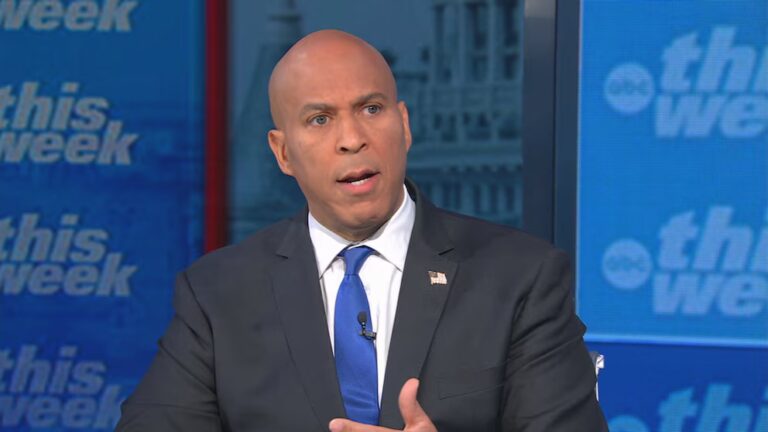
Democrat Stacey Abrams announced she would end her campaign in Georgia’s governor’s race on Friday, putting Republican Brian Kemp in the governor’s mansion and keeping the leadership of Georgia in GOP hands for at least four more years.
In a Friday afternoon speech, Abrams acknowledged that with the state preparing to certify the election results, she could not erase Kemp’s lead. “I acknowledge that former Secretary of State Brian Kemp will be certified as the victor in the 2018 gubernatorial election,” she said. “But to watch an elected official who claims to represent the people in this state baldly pin his hopes for election on suppression of the people’s democratic right to vote has been truly appalling.”
She added that her announcement was not a concession: “Concession means to acknowledge an action is right, true or proper. As a woman of conscience and faith, I cannot concede,” Abrams said.
“I will not concede because the erosion of our democracy is not right,” she added.
Abrams went on to announce the creation of Fair Fight Georgia, a new group that she says will soon be filing a federal lawsuit against Georgia “for the gross mismanagement of this election.”
The announcement comes more than a week after Election Day, and follows a string of legal actions taken by the Abrams campaign and independent groups to ensure that all votes cast in the election were counted as the tally for the race had remained too close to officially call. Kemp declared victory on November 7, even as votes continued to be counted.
Kemp, who served as Georgia’s secretary of state until November 8, was a controversial figure in the election due to his dual roles as candidate and the state’s top elections official. He was repeatedly criticized for a number of measures taken by his office, including voter purges that removed more than a million names from the state’s voter rolls between 2012 and 2016. He has also faced several complaints and lawsuits alleging that he was suppressing minority voters, particularly black voters, in an effort to keep Abrams from winning the election.
The governor’s race was one of the highest-profile political contests in 2018 due to the fight between Kemp, who has campaigned heavily on his support of President Donald Trump, and Abrams, who was vying to become the first black woman governor in the US.
The race was closely watched for signs of the state’s political future — while Georgia has been Republican-led for more than a decade and has consistently backed Republican presidential candidates dating back to 1996, Democrats mounted a highly competitive race this cycle.
Polling repeatedly showed a tight contest between Kemp and Abrams, who clashed over voting issues and their competing visions for Georgia. Kemp ran a hardline campaign styled to resemble Trump, promising to “secure our border, deport criminal aliens, [and] crush gangs” while railing against progressive politics.
“This is the state of Georgia: We are a red state,” Kemp told supporters after winning the state’s Republican primary runoff in July. “We don’t need the radical left telling us how to live, worship and raise our family.”
He reiterated this stance in several of his campaign ads, in which the self-described “politically incorrect conservative” discussed his bona fides while holding a gun or promising to stand for the national anthem. In one ad, he says he has a “big truck in case I need to round up criminal illegals and take them home myself.”
The Georgia race was one of several high-profile races President Trump watched closely. He praised Kemp’s aggressive stance on immigration, calling Kemp “successful,” and claiming Abrams was “unqualified.” He and Vice President Mike Pence both traveled to Georgia shortly before the election to promote Kemp further.
As the race came to a close, Kemp was repeatedly accused of voter suppression
In the last month of the Georgia contest, the state became one of the most prominent voting rights battlegrounds in the country, with much of the focus revolving around Kemp’s role overseeing the election he was competing in.
Kemp faced intensified accusations of voter suppression — particularly among Georgia’s black voters — after 53,000 voter registrations (the majority from people of color) were put on hold for failing to clear the state’s “exact match” process comparing a voter’s registration information to state records.
In the final weeks before the election, Kemp faced multiple lawsuits from groups like the NAACP, the American Civil Liberties Union, and local organizations that argued that several laws and state practices like “signature matching” disproportionately affected voters of color and negated their votes. And Rolling Stone reported on leaked audio of Kemp complaining about Abrams’s voter turnout efforts and saying that the outreach “continues to concern us, especially if everybody uses and exercises their right to vote.”
Abrams previously clashed with Kemp in her role as founder of the New Georgia Project, a group that aims to register voters of color in the state. During the campaign, she argued that Kemp was “creating an atmosphere of fear, [and] making people worry that their votes won’t count.” Abrams’s campaign also joined former President Jimmy Carter and several voting and civil rights groups in calling for Kemp to resign. Kemp did not resign until after the election, telling reporters that he wanted to focus on his transition to governor.
Kemp attempted to push back on criticism by saying that claims of voter suppression in the state were “a farce,” and arguing that he simply wanted to preserve election integrity and combat voter fraud, despite there being little evidence of widespread voter fraud in recent elections.
Kemp’s campaign also argued that “it has never been easier to vote in our state,” claiming that the candidate wanted to “ensure that only legal citizens cast a ballot,” as they tried to defend themselves from allegations of voter suppression and reports that Kemp’s office removed hundreds of thousands of Georgians from the state’s voter rolls over the past five years.
Sourse: vox.com






